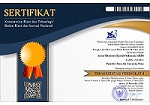ADH-DHARUURAH WA AL-HAAJJAH DALAM RIBA (Studi Analisis Pemikiran Dr. Wahbah Az-Zuhhailii)
Abstract
Abstract World economic system theoretically there are three classifi cations of the global capitalist economy, a socialist economic system and the economic system of Islam. Empirically third of the economic system is the role of fi nancial institutions either banks or non-bank much earlier unknown in Islam systematically. Domination of banking institutions that can be felt has penetrated into the fi eld of business and corporate, political, social, educational and cultural. So unwittingly activities of human life as if controlled by a banking institution. In its operation there is one thing that is often a debate among Muslim scholars that the application of interest in the world banking system. Legality rate system which is still considered debatable spawned two views are contradictory. On the one hand, the system considers different interest with usury, while others looked the same interest as usury. The majority of Muslim scholars regard the laws of usury is forbidden. However, the prohibition of usury in the view-modernist Muslim groups understood rationally. In this case the element of injustice became a central issue on the prohibition of usury. While the neo-revivalist Muslim group to understand the legal prohibition of riba-formal. This raises the logical consequence that the legal system of interest applied in the banking world have the same portion as usury. Az-Zuhaili seem to have the same view with the neo-revivalist. For Az-standing interest in law Zuhaili same as usury. However Az-Zuhaili look at the prohibition of usury is not absolute and not ‘set in stone’. The prohibition of riba can be correlated with the principle of al-dlaruurah wa al-haajah. According usury when faced with conditions very pushy and the urgent need can be allowed with certain restrictions. Az-Zuhaili view that the constituent requires a more in-depth study. As mentioned in the economics of human needs have no limits (red, human needs are endless). In addition the capacity of necessity one can not be measured with standard capabilities someone else. Giving rise to different legal consequences. This has become an important issue in the study of al-dlaruurah wa al-haajah. This study is a library (library research) that is descriptiveanalytic and normative sociological-historical-philosophical. This study used qualitative data analysis in the form of rationalization of deductive and inductive coherently. Defi nitively al-dlaruurah implies a state of danger or diffi culty excessive and sudden lifethreatening human. While al-haajah may imply a need to be realized spontaneously, so that when the need is not met then it would appear negative consequences. The issue of usury in economic activity, which is still being debated, if communicated with the concept of al-dlaruurah wa al-haajah as mentioned Az-Zuhaili memililiki space and capacity of its own. So it can become a legal usury law. Keyword: Adh-Dharuurah, Al Haajjah, Riba
Full Text:
PDFDOI: http://dx.doi.org/10.21927/jesi.2015.5(2).191-218
Editorial Office:
Faculty of Islamic Economics and Business, Universitas Alma Ata
Jl. Brawijaya No.99, Jadan, Tamantirto, Kec. Kasihan, Kabupaten Bantul, Daerah Istimewa Yogyakarta 55184

JESI by http://ejournal.almaata.ac.id/index.php/JESI is licensed under a Creative Commons Attribution-ShareAlike 4.0 International License.





